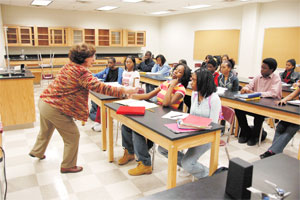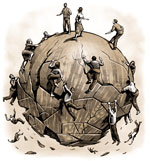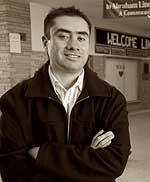|
|
|
|
|
|
 INTO THE FRAY
INTO THE FRAY
Colleges played little part during a generation of school reform. That's no longer an option. States are trying to coordinate all of education, from preschool through college. Amid the political and bureaucratic frustrations are some quiet successes. A PERCEPTION GAPTwo companion Chronicle surveys suggest that, particularly in writing, college freshmen are not as prepared as their high-school teachers believe. CAN'T BEAT THE PRICEHow do you overcome your graduates' financial obstacles to college? Pay their full tuition. Portraits of an experiment in Colorado. FACT-FORTIFIEDPublic schools and colleges in one Nevada county discover that it's easier to improve if you know where you've been failing. DREAM TEAMIn Boston, a school of education and public-school students work together to the benefit of both. MARKET FUNDAMENTALSIn attempting to profit from remedial teaching, some private companies have learned hard lessons in business basics. FOUNDATIONS OF LEARNINGWhat 11 philanthropies are doing to ease the transition from school to college. Commentary MIND THE GAP
MIND THE GAP
If states don't build better links between their school and college systems, students will continue to fall into the chasm between the two, write Michael W. Kirst and Andrea Venezia. Kati Haycock, Charles B. Reed, and Gregory E. Thornton explain what colleges can do to increase the readiness of incoming freshmen. RICKETY SPLITWe must harmonize what high schools expect of their graduates with what college expect of their freshmen, says Chester E. Finn Jr. GOAL ORIENTEDFew states have assessments that truly show whether students are ready for college or the workplace, says Stanley G. Jones. READY OR NOTThe College Board once had standards that were uniform, predictable, and elevating, says Diane Ravitch. Now state and federal policy makers have taken over the job of assessment, and, in her assessment, they're underperforming. THINK AHEADLiberal education is not a job for colleges alone. It should start earlier, says Stanley N. Katz. FRESH IDEASAmerican education needs to be rethought from top to bottom by innovators with an entrepreneurial edge, writes Eugene W. Hickok. GOOD NEWS, BAD NEWSThe good news is that cost is not a significant barrier to a college education, says Greg Forster. The bad news is that our school systems are. WAYS AND MEANSSure, preparation's a problem, says Richard D. Kahlenberg. But cost remains a crucial, and conscious, impediment. BLAME GAMEEducation schools are the scapegoats for society's failure to reward teachers and make learning a priority, says Arthur Levine. |
Discussion: What reforms would better prepare students for college? Resources: Links to related articles previously published by The Chronicle Order Reprints
6 Views of Denver's 'College Now' Program 
"A lot of our kids appreciate the fact that somebody thinks they can do it. They don't hear about college in their lives at home, and so that really means a lot to them." — Christina Chavez-Ingrum, a guidance counselor at Denver's Lincoln High School 
"All these people who have come out against the College Now concept are saying, 'It's going to kill the state financially.' No, it's not. This state spent $2-billion on welfare programs last year. If instead of taking from, these people start putting into the system — Eureka, we've got a plan." — Scott Mendelsberg, who developed Denver's College Now program and now heads Colorado's Gear Up program 
"It's not like we grew up in suburbia. We're urban teenagers trying to better ourselves. And without this, I don't think we would have been able to do it." — Analise Alarid, a College Now student who is pursuing a degree program in multimedia studies 
"Community-college and university faculty get together and talk about transitions--how to make sure courses will transfer. We don't do that with high-school faculty, and we should. We did do it with Lincoln, but it shouldn't be a one-shot deal." — Christine Johnson, president of the Community College of Denver 
"Our responsibility now is to prepare students to succeed once they get to that new level. We can offer them hope, but if they're not prepared for that hope, it will vanish." — Antonio Esquibel, principal of Denver's Lincoln High 
"I've had lots of friends tell me, 'I'm not going to college for this or that reason.' With College Now, there's no excuse." — Javier SanMiguel, a College Now student at Lincoln High |